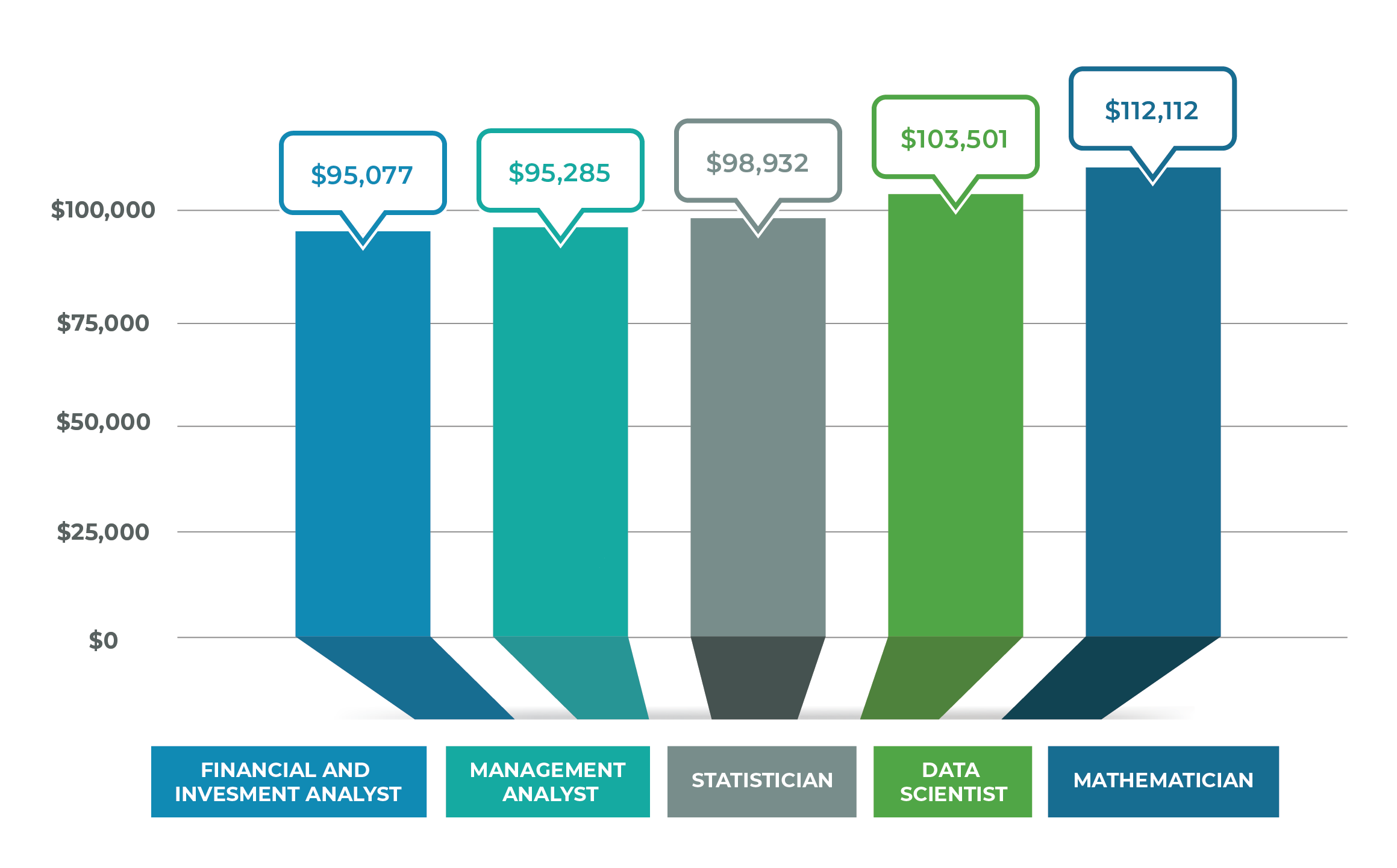
Careers in Applied Statistics and Data
Career Landscape for Professionals with a Master’s in Applied Statistics
Opportunities for Data Professionals
Professionals with statistics and data analytics skills can work in any industry that excites them, because they can solve problems that not only require specialized skills and training, but also imagination and creativity. Data-centric professions are among the best careers available, as the global Big Data market is expected to reach $105.08 billion by 2027.
Statistician is the #4 Business Job and #9 Best Job Overall in 2024
U.S. News & World Report
A survey of executives from a range of industries found that 92.1% are investing in data initiatives (NewVantage Partners, “Data and AI Leadership Executive Survey, 2022”). However, only 26.5% of those surveyed say their organization has reached its data-driven potential. Across companies, the ability to act on data lags far behind the ability to collect and store it. That is why data expertise remains in high demand.
Analysts, data scientists and statisticians with master’s degrees can transform the way their organizations leverage data by making it actionable and applying it to a broad array of decisions. From helping governments reduce hunger to helping insurance companies establish viable rates, these professionals play a vital role across numerous industries and types of organizations.
Analyst, Data Scientist and Statistician Degree Requirements
While not all statistics careers require master’s degrees, advanced education can help you be more competitive in the field. Even for some of the early-stage career paths available, most statistics professionals have at least a master’s. For example, Salary.com shows that 60% of users who hold the title Statistician I have a master’s degree.
Advanced education becomes more essential for getting into analytics and statistics careers that revolve around creating complex models and algorithms. According to Burtch Works’ 2021 Predictive Analytics, Marketing Research & Data Science Salary report, 87% of predictive analytics professionals and data scientists hold an advanced degree. The survey also found that these professionals are increasingly pursuing degrees in statistics rather than general business degrees such as an MBA.
Additionally, earning an applied statistics master’s degree can help you maximize your earning potential, regardless of the career path you choose. According to PayScale, professionals with a master’s degree in statistics earn 15% more, on average, than those with just a bachelor’s.
Statistician degree programs at the master’s level offer extensive, hands-on experience with advanced statistical methods for modeling and making more accurate predictions. View the University of Delaware’s online M.S. in Applied Statistics curriculum page for more information about what to expect when pursuing a statistics master’s degree.
Master’s in Applied Statistics Salary
According to Lightcast, a labor market analytics company, the average salary for statisticians and mathematicians is highly competitive at $99,840. The Bureau of Labor Statistics discovered very similar data, listing an average salary of $98,960 for statisticians and mathematicians.
Job Titles in Statistics With Corresponding Salary Figures

Source:Lightcast, 2023
What Data Experts Do
Data experts try to answer questions by collecting, analyzing, and interpreting data to gain actionable insights. Their work typically involves using computer software to format, clean and manage the data their organizations collect for advanced analysis. From there, they may create models, make predictions, or look for trends that indicate opportunities or problems. The applied statistics and analytics fields have matured significantly over the past several years, and this has put more emphasis on data experts’ ability to communicate insights to leadership teams. They play an increasingly pivotal role in creating new business strategies as well as identifying ways to make operations more efficient.
“The program gave me exposure to plenty of resources and tools such as Python, SAS, R and JMP. They provided me with knowledge and a skillset I can use to adapt to things more quickly compared to if I didn’t go through the program.”
Mark Buchholz, MS in Applied Statistics Graduate
Where Data Experts Work
The top 10 industries hiring statisticians are:
- 1. Scientific research and development services
- 2. Pharmaceutical and medicine manufacturing
- 3. Colleges, universities and professional schools
- 4. Insurance carriers
- 5. Management, scientific and technical consulting services
- 6. Hospitals and medical centers
- 7. Software publishers
- 8. Banks and credit unions
- 9. Government agencies
- 10. Accounting, tax preparation, bookkeeping and payroll services
Source: Burning Glass Technologies, 2022
“Statistician” is likely one of the first job titles people associate with a statistics degree program. However, graduates hold a range of positions with titles such as:
- Statistical Programmer
- Biostatistician
- Data Analyst
- Data Scientist
- Systems Analyst
- Credit Analyst
- Compliance Manager
- Business Intelligence Manager
- Quality Engineer
- Marketing Analyst
- Supply Chain Manager
- Financial Planner
- Insurance Researcher
- Communications Manager
- Data Modeler
- Environmental Scientist
- Network Administrator
- Pharmaceutical Engineer
- Sales Engineer
Request Information
To learn more about the University of Delaware’s Master of Science in Applied Statistics, fill out the fields below to download a free brochure. If you have additional questions, please call 844-247-6251 to speak with an Admissions Counselor.
